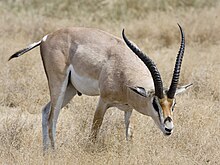Grant's gazelle
The Grant's gazelle (Nanger granti) is a species of gazelle. It lives in many parts of East Africa.[3] Its Swahili name is Swala Granti.[4] It is named after explorer James A. Grant.[5]
| Grant's gazelle | |
|---|---|

| |
| Scientific classification | |
| Domain: | Eukaryota |
| Kingdom: | Animalia |
| Phylum: | Chordata |
| Class: | Mammalia |
| Order: | Artiodactyla |
| Family: | Bovidae |
| Subfamily: | Antilopinae |
| Genus: | Nanger |
| Species: | N. granti
|
| Binomial name | |
| Nanger granti | |
Description
changeThe Grant's gazelle stands 75–95 cm (30–37 in) tall. The females weigh between 35 and 50 kg (77 and 110 lb) and males weigh between 50 and 80 kg (110 and 180 lb).[4] Its coat is a beige orange on the back with a white belly. The Grant's gazelle looks similar to a Thomson's gazelle, except for some distinguishing features, such as a different horn shape. Grant's gazelles are very fast.
The Grant's gazelle is found in East Africa. It lives in open grass plains and shrublands. They are well adapted to dry areas.[3] They get most of their water by eating plants.[6]
Predators
changeThe most common predators of the Grant's gazelle are cheetahs[7] and wild dogs. Humans also hunt gazelles. Jackals are predators of fawns.
Status
changeThe Grant’s gazelle is still a common species, but its population is going down.[1] Estimates of the population range from 140,000 to 350,000. It is threatened by habitat destruction and hunting. It is protected in national parks and reserves in Tanzania and Kenya.
References
change- ↑ 1.0 1.1 IUCN SSC Antelope Specialist Group 2008. Nanger granti[permanent dead link]. In: IUCN 2011. IUCN Red List of Threatened Species. Version 2011.1
- ↑ Nanger granti Archived 2011-09-19 at the Wayback Machine, MSW3
- ↑ 3.0 3.1 Peter Arctander; et al. (1996). "Extreme genetic differences among populations of Gazella granti, Grant's gazelle, in Kenya" (PDF). Heredity. 76 (5). Retrieved 2008-06-19.
- ↑ 4.0 4.1 Grant's Gazelle[permanent dead link], Out of Africa
- ↑ Margot Freeman. "Names of African Gazelles". Demand Media/WHALEROCK DIGITAL MEDIA, LLC. Archived from the original on 19 January 2016. Retrieved 24 July 2015.
- ↑ Western, D., 1975. Water availability and its influence on the structure and dynamics of a savannah large mammal community. East African Wildlife Journal, vol.13, pp.265-286.
- ↑ M. W. Hayward; et al. (2006). "Prey preferences of the cheetah (Acinonyx jubatus) (Felidae: Carnivora): morphological limitations or the need to capture rapidly consumable prey before kleptoparasites arrive?". Journal of Zoology. 270 (4): 615–627. doi:10.1111/j.1469-7998.2006.00184.x. Retrieved 2008-06-19.[permanent dead link]
